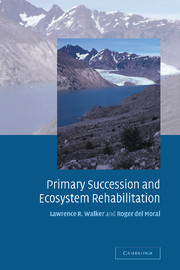Book contents
- Frontmatter
- Contents
- Preface and acknowledgements
- 1 Introduction
- 2 Denudation: the creation of a barren substrate
- 3 Successional theory
- 4 Soil development
- 5 Life histories of early colonists
- 6 Species interactions
- 7 Successional patterns
- 8 Applications of theory for rehabilitation
- 9 Future directions
- Glossary
- Illustration credits
- References
- Index
6 - Species interactions
Published online by Cambridge University Press: 08 January 2010
- Frontmatter
- Contents
- Preface and acknowledgements
- 1 Introduction
- 2 Denudation: the creation of a barren substrate
- 3 Successional theory
- 4 Soil development
- 5 Life histories of early colonists
- 6 Species interactions
- 7 Successional patterns
- 8 Applications of theory for rehabilitation
- 9 Future directions
- Glossary
- Illustration credits
- References
- Index
Summary
Introduction
Species interactions are pivotal to succession because species change is not merely the independent response of each species to physical changes in its environment. Species' impacts on their environment affect other species. Even in the barren landscapes of early primary succession, species interactions are important. Exceptions include some dunes, floodplains or volcanoes where persistent abiotic disturbances reduce the importance of interspecific interactions (Partomihardjo et al., 1992; Houle, 1997; but see Shumway, 2000) or isolated areas where dispersal is the principal limiting factor (Fridriksson, 1987; Lukešová & Komárek, 1987; see section 5.3 on dispersal). Sometimes overall patterns of succession are best explained by changing life histories and life forms of dominant species without a need to invoke species interactions (Walker et al., 1986; McCook & Chapman, 1993; Chapin et al., 1994). However, interactions generally alter both the rate and trajectory of primary succession.
Plants selectively concentrate soil nutrients, transport water from the soil to the atmosphere and add organic matter when they decay. Plants also remove resources and impact their neighbors that need the same, often limiting resources. Animals alter soils by burrowing, feeding, defecating and dying. Animals use plants as food, nest sites and protection and affect each other as they search for these resources. All these interactions have a profound impact on succession. Studies of interactions in primary succession are particularly productive because of the opportunity they provide to observe how community interactions develop without the complications of legacies from earlier communities.
- Type
- Chapter
- Information
- Primary Succession and Ecosystem Rehabilitation , pp. 189 - 231Publisher: Cambridge University PressPrint publication year: 2003
- 1
- Cited by



